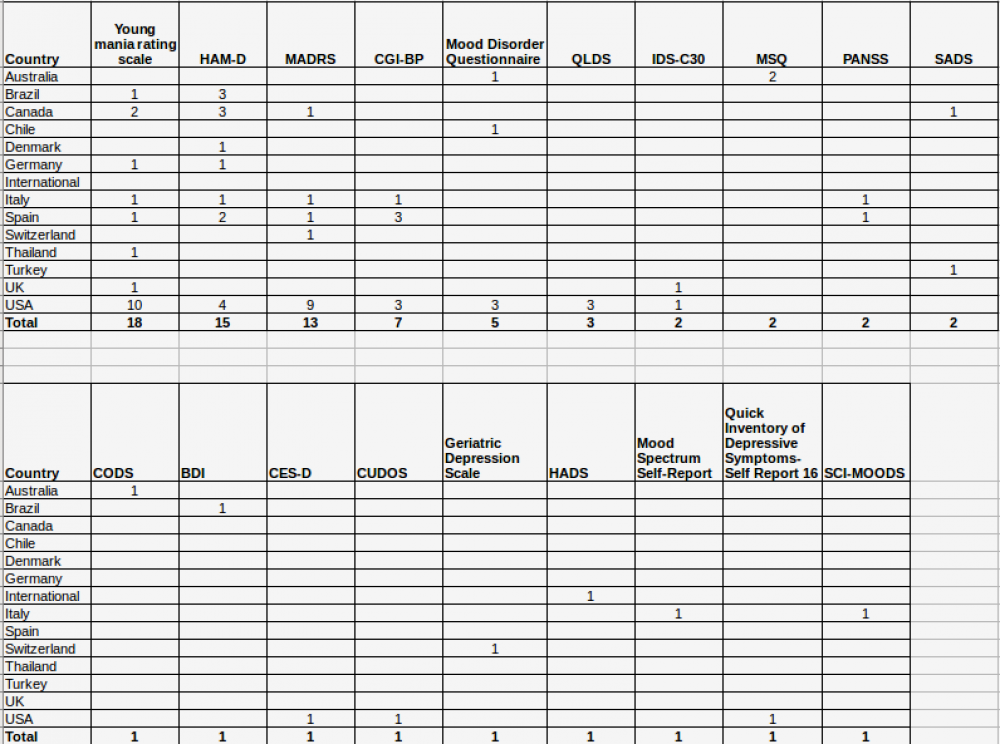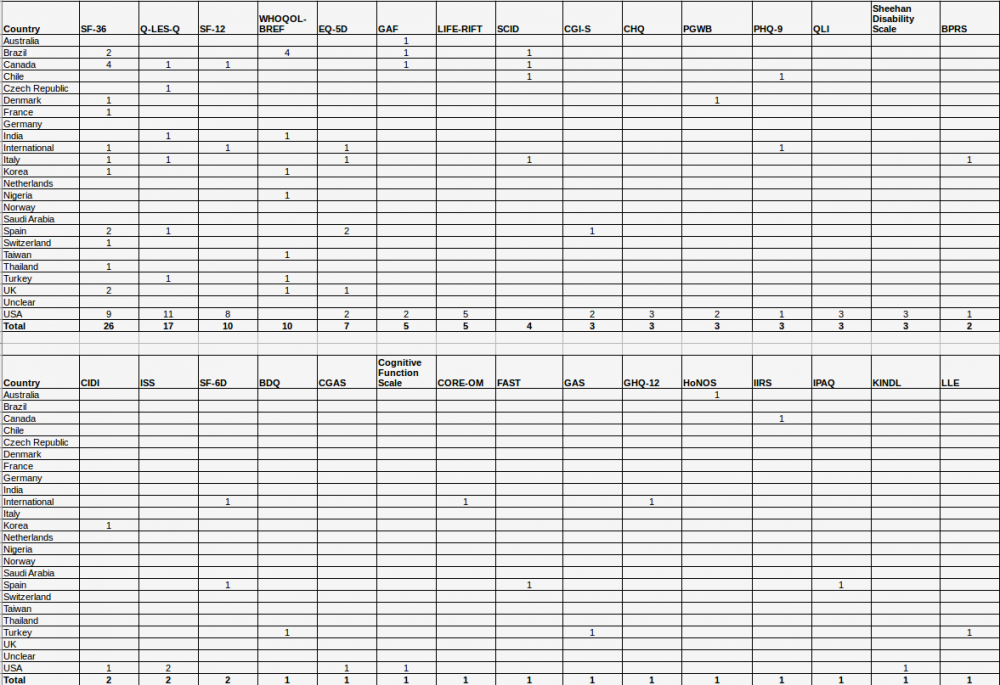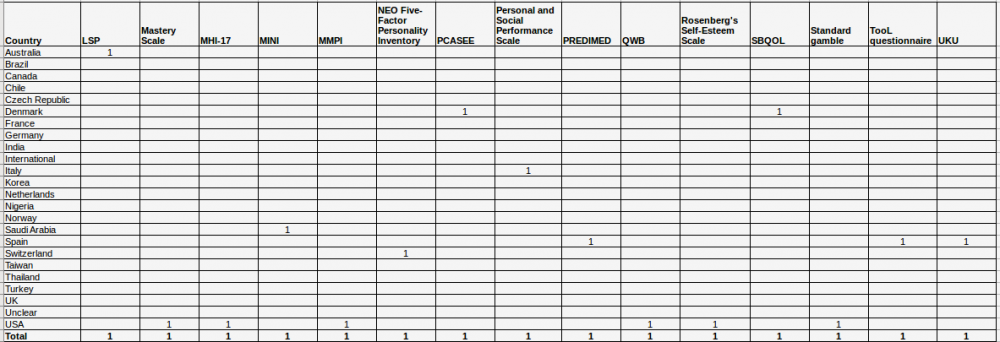An effortless and comprehensive approach to burden of illness reviews
Blog - PRO tools in bipolar disorder
Published: 29-12-2016
We used the heoro.com database to develop an evidence map of PRO tools that have been used in studies of people with bipolar disorder, which took us approximately 5 hours. Here's what we found.
We searched the heoro.com Dashboard for Disease Bipolar disorder, Study type PRO study, on 16th December 2016. We found a total of 127 abstracts that had been indexed in PubMed since 1960, which reported the use of 85 different PRO instruments.
Of these 85 instruments, 19 were specific for bipolar disorder, depression or mania, 45 were general instruments used to evaluate quality of life, functioning or utilities, nine assessed other conditions or diseases that were common comorbidities of people with bipolar disorder, including anxiety, eight assessed treatments or adherence, three evaluated the impact of the disease on work productivity and one assessed caregiver burden. The most frequently used tool was the SF-36, cited in 26 abstracts, followed by the Young Mania Rating Scale (18 abstracts), Q-LES-Q (17 abstracts), Hamilton Depression scale (15), MADRS (13) and SF-12 and WHOQOL-BREF (10 each).
The United States was the most common setting, with 56 abstracts, followed by the United Kingdom (8 abstracts), Canada and Italy (7 abstracts each), then Australia, Brazil and Spain (6 abstracts each). Drug interventions were assessed in 28 abstracts,and psychological interventions in 15.
The evidence maps showing the geographical locations where each tool has been used are reported below.
Number of abstracts citing each PRO instrument by geographical location: disease-specific tools

Number of abstracts citing each PRO instrument by geographical location: general tools

Number of abstracts citing each PRO instrument by geographical location: general tools (continued)

Number of abstracts citing each PRO instrument by geographical location: tools assessing comorbidities

Number of abstracts citing each PRO instrument by geographical location: other tools

The evidence map shows that a wide range of PRO tools have been used in studies of bipolar disorder, but only ten tools were cited in more than five abstracts each. Research into the quality of life in bipolar disorder has generally been assessed from a US perspective.
Key
BAS: caregiver burden scale
BDQ: Brief Disability Questionnaire
BPRS: Brief Psychiatric Rating Scale
CGAS: Children's Global Assessment Scale
CGI-BP: Clinical Global Impression for Bipolar Disorder
CGI-S: Clinical Global Impressions-Severity of Illness
CHQ: Child Health Questionnaire
CIDI: Composite International Diagnostic Interview
CODS: Consequences of Depression Scale
CORE-OM: Clinical Outcomes in Routine Evaluation - Outcome Measure
CTD: Cognitive Test for Delirium
CUDOS: Clinically Useful Depression Outcome Scale
DAI-10, DAI-30: Drug Attitude Inventory
EWPS: Endicott Workplace Productivity Scale
FAST: Functioning Assessment Short Test
GAD-7: Generalised Anxiety Disorder Assessment
GAF: Global Assessment of Functioning
GAS: Global Assessment Scale
GHQ-12: General Health Questionnaire
HADS: Hospital Anxiety and Depression Scale
HAM-A: Hamilton Anxiety Rating Scale
HAM-D: Hamilton Depression rating scale
HoNOS: Health of the Nation Outcome Scales
IDS-C30: Inventory of Depressive Symptomatology-Clinician-Rated
IIRS: Illness Intrusiveness Rating Scale
IPAQ: Impact on Participation and Autonomy questionnaire
ISS: Internal State Scale
IWQOL-Lite: Impact of Weight on Quality of Life-Lite
KINDL: Revised Children Quality of Life Questioinnaire
LIFE-RIFT: Longitudinal Interval Follow-up Evaluation-Range of Impaired Functioning Tool
LLE: List of Life Events
LSP: Life Skills Profile
MADRS: Montgomery Asberg Depression Rating Scale
MARS: Medication Adherence Rating Scale
MHI-17: Mental Health Index-17
MINI: Mini International Neuropsychiatric Interview
MMPI: Minnesota Multiphasic Personality Inventory
MSQ: Mood Swings Questionnaire
OCDS: Obsessive Compulsive Drinking Scale
OPQ: Occupational Performance Questionnaire
PANSS: Positive and Negative Syndrome Scale
PGWB: Psychological General Well-Being
PHQ-9: Patient Health Questionnaire
PREDIMED: Mediterranean diet questionnaire
PRISE: Patient Rated Inventory of Side Effects
PSQI: Pittsburgh Sleep Quality Index
Q-LES-Q: Quality of Life Enjoyment and Satisfaction Questionnaire
QLDS: Quality of Life in Depression Scale
QLI: Lehman Brief Quality of Life Interview
QWB: Quality of Well-Being scale
SADS: Schedule for Affective Disorders and Schizophrenia
SBQOL: SmithKline Beecham Quality of Life
SCID: Structured Clinical Interview for DSM disorders
SMAQ: Simplified Medication Adherence Questionnaire
TooL: Tolerability and Quality of Life
UKU: Udvalg for Kliniske Undersogelser